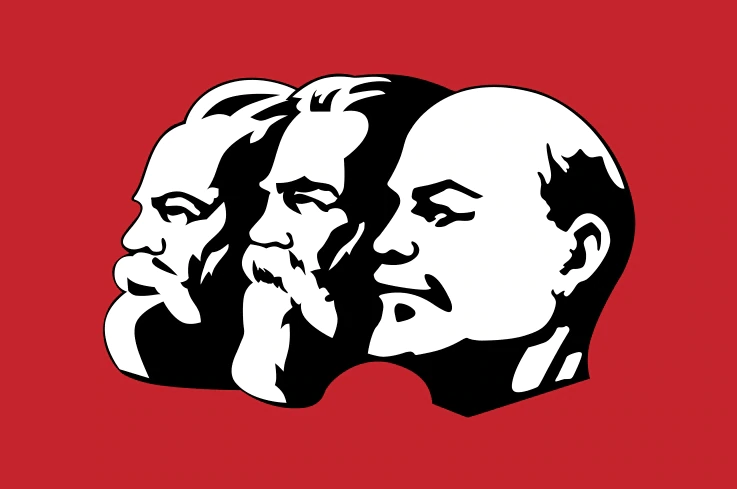More languages
More actions
| Line 14: | Line 14: | ||
=== Dialectical and historical materialism === | === Dialectical and historical materialism === | ||
Marxism- | Marxism-Leninism follows the various tenets of Marx's materialist conception of history, such as primacy of the development of the [[Forces of production|productive forces]] in driving historical change. | ||
=== Critique of imperialism === | === Critique of imperialism === | ||
Revision as of 06:20, 17 April 2022

Marxism-Leninism is a world outlook based on dialectical materialism, the materialist conception of history, and Marxist political economy including the Leninist conception of imperialism. It follows the application of Marxist theory by Vladimir Lenin and the Bolsheviks to the strategy and tactics of revolution.
After the success of the Russian revolution in 1917 and the establishment of the Soviet Union in 1922, many communist parties around the world began to adopt Marxism-Leninism as their political line, and Marxism-Leninism was the main theoretical framework which guided the Korean, Vietnamese, and the Chinese revolutions as well as other national liberation and revolutionary movements in Africa, Asia and Latin America.
Today, Marxism–Leninism is one of the theoretical foundations that govern communist parties in China, Cuba, Laos and Vietnam, and it is the political line of many surviving communist parties.
Origin of the term
In the 1920s, the term Marxism-Leninism was first formulated as well as defined by Joseph Stalin based on his understanding of Orthodox Marxism and Leninism.
Lenin never used the term "Leninism", nor did he include his ideas in the term "Marxism-Leninism". His ideas developed out of classical Marxist thought. His ideas were seen by the Bolsheviks and many later communists as a major advance in Marxism.
Characteristics
Dialectical and historical materialism
Marxism-Leninism follows the various tenets of Marx's materialist conception of history, such as primacy of the development of the productive forces in driving historical change.
Critique of imperialism
Imperialism as seen and described by Lenin is the highest stage of capitalism,[1] involving the domination of the economy by monopolies and the export of capital as the principal form of exploitation and accumulation engaged in by the advanced capitalist countries. Imperialism in the Leninist sense is essentially limited to the capitalist era.
Imperialism entails savage competition between the leading capitalist counties for colonies and spheres of influence, culminating in imperialist wars (such as the First Wold War, which Lenin witnessed).
Party organization principles
Marxist-Leninist parties usually adhere to the principle of democratic centralism which involves free debate and democratic development of party policies, but strict adherence by party members to those policies once the policies have been chosen.
Strategy and tactics of revolution
Marxist-Leninists hold that successful revolutions involve more than spontaneous, elemental action by the masses but require a vanguard party to provide them theoretical guidance and, in the revolutionary moment, tactical leadership. The vanguard (Communist) party is based on full-time revolutionaries and is a repository of revolutionary experience.
Theory and practice of the dictatorship of the proletariat
Marxist-Leninists adhere to Marx's two-stages model of communism, involving an initial, "lower" stage, often termed "socialism", which is transitional between capitalism and "higher" stage communism in which the state, money, and other vestiges of capitalism and class society no longer exist. In the lower stage a state, controlled by the proletariat, remains necessary to defend against counter-revolution and to guide society away from capitalistic behaviours and toward cooperation and the "free association of the producers" which characterise true or higher-stage communism. The lower stage is also known as the dictatorship of the proletariat since it involves control of society by the proletariat.
Belief in the necessity of the dictatorship of the proletariat distinguishes Marxist-Leninism from more anarchistic tendencies within social liberation theory.
Signification
The term Marxism-Leninism generally distinguishes parties which took the Russian Revolution of 1917 as foundational from other Marxist or socialist formations such as libertarian socialism, Eurocommunism, Austro-Marxism, Bernsteinianism, syndicalism, anarcho-communism, DeLeonism, social democracy etc.
